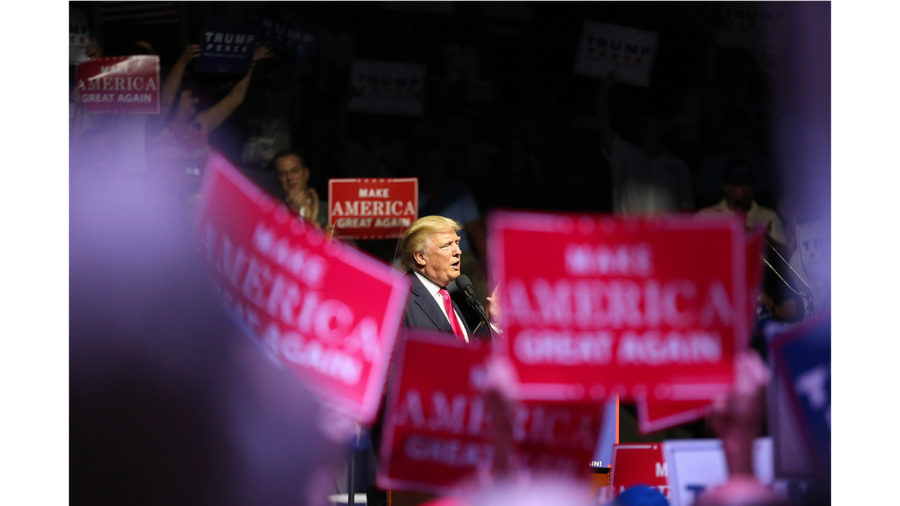In my own opinion, Donald Trump is a corrupt and elderly hedonist, an unbalanced trust fund kid who is giving a very impromptu run for president. I did not think he would make it this far, and I don’t know many others who did either (although my former debate partner did, or deserves an anonymous tip of the hat for that prescient prediction).
Recently, though, the Goddess of Pop went a few steps further than “corrupt and elderly hedonist,” and got me thinking about historical parallels. While giving the opening remarks at a Hillary Clinton fundraiser last week, pop singer Cher became one of the latest individuals to compare Donald Trump to Nazi Fuhrer Adolf Hitler, joining a group which includes comedian Louis C.K. (who wrote in an email to his fans in March that “[Trump] is Hitler. And by that I mean that we are being Germany in the 30s.”), three Mexican presidents, a group of Oxford dons who recently claimed that their tests reveal that “Trump is more psychopathic than Hitler” and Salon writer Fedja Buric (actually only implicitly, taking a different twist on the dictatorial topic by penning an article entitled “Trump’s not Hitler, he’s Mussolini”). Of course the “Person X is Hitler” trope has a long and distinguished history in American political parlance, and I would point any interested party in the direction of Michael Lind’s excellent article on the subject in the March 8, 2016 edition of Politico Magazine.
While the comparison is hardly original, it is fairly commonplace (both points amply backed by the fact that the Google search “Donald Trump Hitler” returns 14.3 million hits). However, regardless of its originality or partiality, the question to be asked in response to this most common of accusations is: is this a fair comparison? Is the billionaire real estate mogul truly comparable to one of the most terrifying, powerful and cruel world leaders of all time? Well, yes and no.
In the most common area of comparison, beliefs, however, the answer is a clear no.
For starters, Der Fuhrer was an ideologue, plain and simple. His beliefs as expressed in Mein Kampf might as well have been carved into stone tablets and remained unshaken into his last days in his Berlin bunker. Hitler claimed he wanted to destroy the parliamentary system of the republic, and then he did. Hitler claimed he wanted to destroy the Jews of Europe, and then he did. Hitler said he wanted to go to war with the Soviet Union and then—after a brief period of peace under the Molotov-Ribbentrop Agreement—he did.
Even when it would have been in both Hitler’s interest and those of the Third Reich to not do these things (examples include not invading Soviet Russia and instead focusing on Great Britain, or not exterminating the “sub-human” Slavs and instead treating them as allies against the Soviets, or not destroying the Jews because aside from its sheer evilness it was also a pretty irrational act) Hitler did them, because he truly appears to have believed in them. If nothing else, the man was consistent.
Trump, on the other hand, not so much. He cannot be said to have evil or racist ideologies, because he cannot be said to have an ideology at all. Trump’s beliefs appear to be endlessly fluid, as exemplified by the mogul’s declaration—in Texas of all places—that he is willing to be softer on immigration and maybe not pursue his trademark “wall” policy (though policy seems like too high of a term for the entire wall idea, which resembles nothing so much as a particularly clumsy propaganda prop). At various times, Trump has been for and against abortion, for and against strict immigration controls, for and against mass deportation, for and against free trade, for and against criminal justice reform, for and against torture and the list just goes on. More broadly one could say that Trump is for and against conservatism, for and against liberalism and even for and against pragmatism. The endpoint of all of this flip-flopping in the context of the comparisons to the Nazi leader, though, is simple: Trump is no Adolf Hitler. (And Louis C.K., if you’re reading this, please go read about the Weimer Republic before making broader time and place comparisons; I have yet to need a wheelbarrow of cash to purchase a loaf of bread.)
Now, the more nuanced critics will counter this by saying that Trump might not be exactly like Hitler in specific beliefs, but rather is like the Nazi leader in presentation: He’s a fear monger and a demagogue whose chaotic and giant rallies are nightly an eerie parallel to the Sportpalast.
Even here, however, the comparisons do not hold up. Lots of would-be politicos have giant rallies with chanting and violence and angry words, at all levels of politics. What really set the Nazis apart from others – and why we still think envision exactly what a Nazi rally looks like so vividly in our collective imagination – was organization and presentation. These carefully choreographed events, with a detailed script and order of events, could not be more different from a Trump rally or from how Trump presents himself. Likewise, Hitler’s and Goebbels’ speeches were always on topic, always pounding away at the same themes over and over again; with Nazis you always knew, for better or worse – and defiantly worse, I mean, it’s Hitler after all – what you were getting. With Trump, every rally has a new surprise, a new stance or a new rambling retraction of a statement from the day before. On presentation, then, Trump is again no Hitler.
Instead, Trump is comparable to Hitler at a deeper level, a level which goes beyond beliefs or presentation to something more guttural, more primal and even more messianic.
During his acceptance speech at the RNC Convention in Cleveland, Trump said he alone could save America and that he alone could help the American people, that there is no one else who can help us and without him all will be lost. This is where the similarity between these two men really is: personality politics. Trump does not ask for votes because he believes in something, because he has a cause or a policy he is pushing or because he cares about you, the voter. He asks for votes because he is Donald Trump – indeed, the only Donald Trump – and only Trump can change things, fix things, save things. In a similar vein, Hitler embraced personality politics: people voted for the Nazis because they were led by Hitler and because they believed that only Hitler and Hitler alone could save the German people.
This is a disturbing trend for the American democracy, or for any democracy. Of course personality politics is almost inseparable from politics at some level, but Trump takes it beyond where almost anyone ever has before. He identifies with nothing; he is allied with no one; he supports no cause. He is who he is, and if he believes anything, he believes – and it appears that millions of Americans believe – that this fact alone should be enough to send him to the White House.
Perhaps then, in the end, the historical individual whom The Donald most resembles is not the evil and vicious ideologue Adolf Hitler, but another New Yorker, the narcissistic and valueless Aaron Burr, of whom Alexander Hamilton once said in words that could very easily describe the Republican nominee this year: “There is nothing in his favor. His private character is not defended by his most partial friends. He is bankrupt beyond redemption, except by the plunder of his country. His public principles have no other spring or aim than his own aggrandizement, per fas aut nefas.”
































